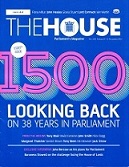HEALTH AND CARE BILL
| 13th January 2022: Lord Faulkner of Worcester: My contribution to the debate on the Health and Care Bill. My Lords, I am very pleased to follow all noble Lords in supporting all the amendments in this group. I congratulate my noble friend Lady Thornton on the way in which she introduced the debate when moving Amendment 11. I will speak briefly to Amendment 66, which was tabled by the noble Lord, Lord Young of Cookham, and signed by the noble Lord, Lord Rennard, and me. It was enjoyable listening to the noble Lord, Lord Young, taking a voyage down memory lane to more than 40 years ago, when he was a Health Minister. He could perhaps have added that we would have become a smoke-free country rather earlier, had his advice and proposals for tobacco control been accepted at the time, and had he not been removed from health on the instruction of Sir Denis Thatcher and given another role in government. He is and remains a pioneer, and I am delighted to be behind him with his amendments; we shall come to other smoking amendments later. Amendment 66 would require integrated care boards to address the leading preventable causes of sickness and death, particularly smoking. The Bill as drafted fails to get to the root causes of health inequalities and will have only a limited effect. Our amendment would correct this oversight as far as smoking is concerned. In 2019, there were 5.7 million smokers in England, one in seven of the adult population. As the noble Lord, Lord Rennard, said, in England smoking is the leading cause of premature death, killing over 70,000 people a year and leaving 30 times as many suffering from serious smoking-related disease and disability. As Sir Chris Whitty, the Chief Medical Officer, said in a lecture on public health at Gresham College last May, smoking is likely to have killed more people in 2020 than Covid-19, but unlike Covid-19, smoking kills on the same scale every year, and will go on doing for many years without robust action to correct this. It is worth pointing out that he also said that one in five people who die from cancer will die from lung cancer, and “the reason that people like me get very concerned and very upset about it is that this cancer is almost entirely caused for profit. The great majority who die of this cancer … die so that a small number of companies make profits from the people who they have addicted in young ages, and then keep addicted to something which they know will kill them. So lung cancer is unfortunately still a very major problem” that exists almost entirely because of smoking for profit. While overall smoking rates have fallen significantly over the last 20 years, the difference in smoking rates between the most disadvantaged group and the general population has become more pronounced: the inequality has widened. This includes people with mental health conditions, pregnant women, those in routine and manual occupations, and those living in social housing. There is a real risk that people from these groups will be left behind as we move towards a smoke-free 2030. Given current trends in smoking, Cancer Research UK has estimated that we will miss the smoke-free 2030 target by seven years, and the most deprived quintile will not reach the target until the mid-2040s. This amendment will help to ensure that this prediction does not become reality. The Government announced their ambition to make England smoke-free by 2030 in the 2019 prevention Green Paper. However, in the two years since, we have seen no sign of the “bold action” that the Government acknowledged is needed to achieve the 2030 ambition. In December 2020, the Government announced that a new tobacco control plan would be published in July 2021 to deliver that ambition. This did not happen and last month, the Minister, the noble Lord, Lord Kamall, told Parliament that publication had slipped to 2022, with no date specified. With only eight years left until 2030, there is an urgent need for action to back up the Government’s rhetoric. This Bill is a great opportunity to get us on track to deliver a smoke-free 2030, and to tackle the severe health inequalities plaguing our society. I urge the Government not to squander this opportunity and to accept this amendment, along with the other amendments on smoking which we will come to later in Committee. A link to to the full debate can be found here |


































